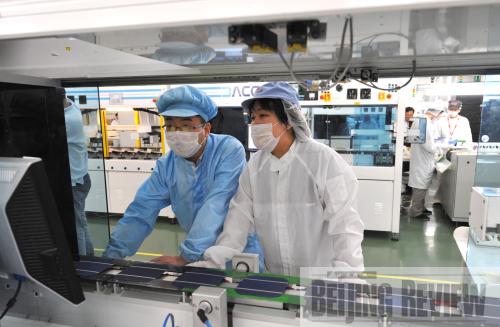|
 |
|
COMPETITIVE EDGE: Suntech Power's patented Pluto technology won the company worldwide recognition for its advanced technology. It will help Suntech cut production costs (CHEN QI) |
Tight credit, weak demand, excess capacity, bloated inventories and escalating price competition all have hurt China's export-reliant solar power companies and have left many struggling for their lives during the global recession. But the largest of them, Wuxi-headquartered Suntech Power Holdings Co. Ltd., is about to breathe a little easier after securing several deals with the Chinese Government and opening factories in the United States to mitigate pressures from shrinking demand in European markets.
Orders are being placed and shipments are on the rise, though the NYSE-listed company posted an 81-percent plunge in second-quarter earnings on August 20, as revenues tumbled due to sharply lower prices for its products.
"A seasonal pickup in demand combined with a gradual thawing of global financial markets and improving project returns led to sequential shipment growth in most of our major markets," the company said in its quarterly report. "Despite pricing pressure, our continued reduction of silicon costs enabled us to improve our gross margin."
While Shi Zhenlong, founder of Suntech Power, has successfully navigated the solar energy giant to a safe place and managed to pull a profit while most of the company's Chinese peers have reported losses, a massive reshuffling of the industry's excess capacity is inevitable.
No more easy money
Prices for solar panels have dropped dramatically this year because of a lack of demand resulting from the global recession. Making the situation worse, solar incentives have been cut in Spain and Germany, leading to an oversupply of panels in the market.
In order to fulfill their commitments to the Kyoto Protocol, European Union member states since 2000 have heavily subsidized renewable energies including the solar industry, a major factor that urged on development of the solar power market around the world.
"Without explosive growth in the solar power industry in European markets, Suntech would not have had success, " said Shi.
Prices for polycrystalline silicon, or polysilicon, have increased rapidly to $450 per kg last summer thanks to their generous subsidies. Spurred by price hikes, the global PV industry expanded rapidly. Statistics from the Chinese Renewable Energy Industries Association said that China produced 1.1 gigawatts of solar power capacity, accounting for 27 percent of global output in 2007 and making it the world's largest solar cell and panel producer.
But China's solar energy industry is vulnerable to external impacts because it relies upon imported polysilicon as a raw material while exporting 98.5 percent of its products to European and North American markets, said Zhou Dadi, former Director General of the Energy and Research Institute under the National Development and Reform Commission (NDRC).
Optimistic about solar energy's future, panel makers like Suntech Power and LDK Solar Co. Ltd. have increased their inventories. Unfortunately, the economic recession washed through. Countries like Germany and Spain began to cut solar subsidies last October, which caused polysilicon prices to fall drastically to as low as $50 per kg.
| 